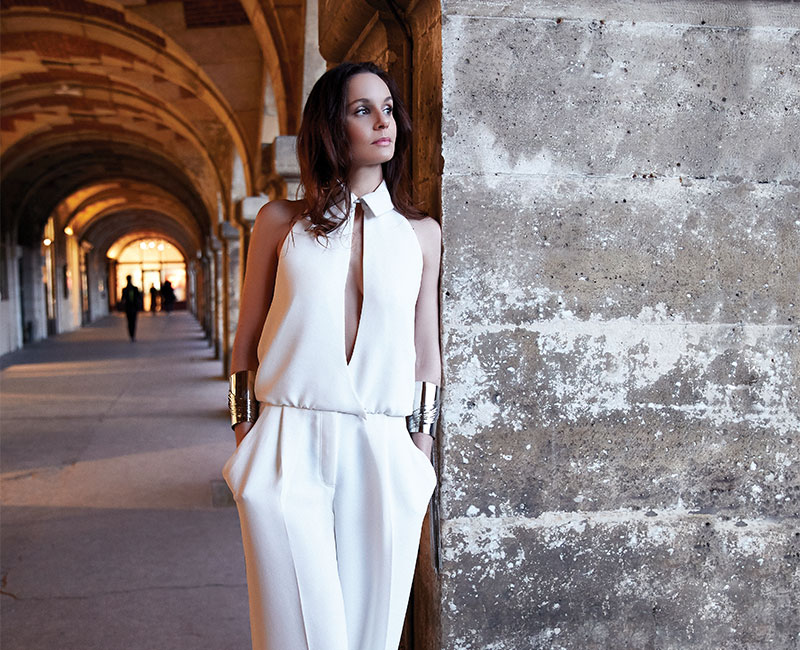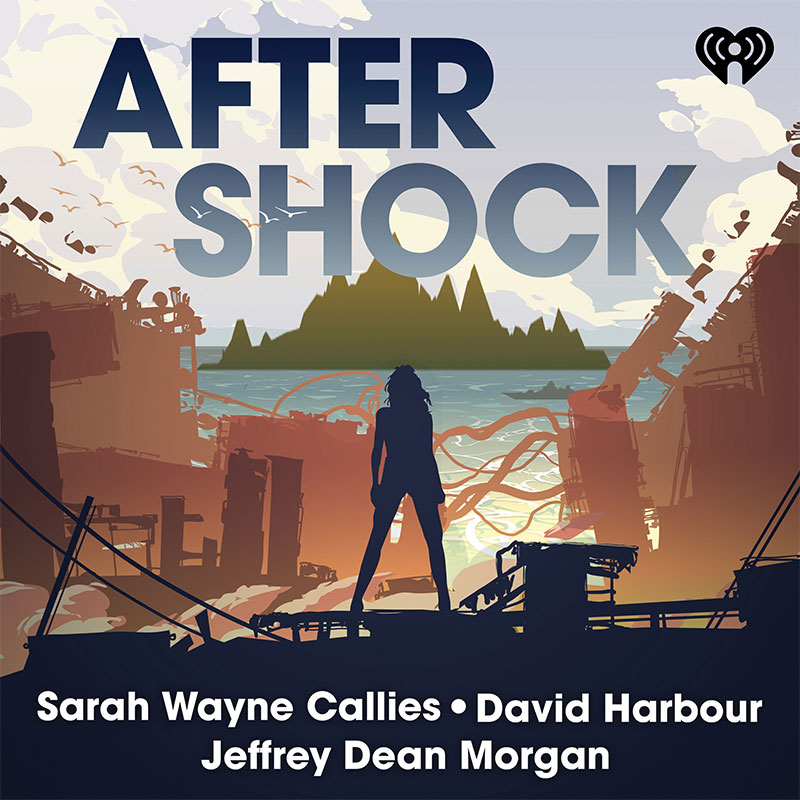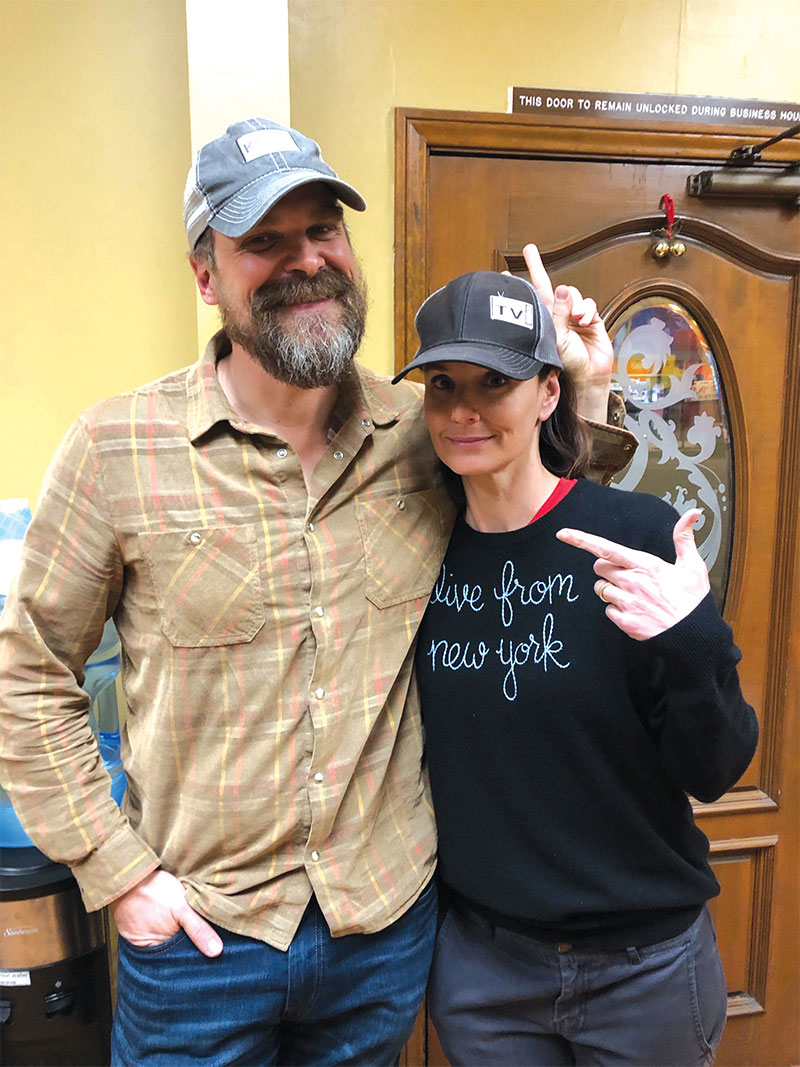Sarah’s Shockingly Amazing Podcast
Sarah Wayne Callies turns up the heat as scores of listeners tune in to the former Hawai‘i resident’s thrilling post-apocalyptic podcast, Aftershock.
The woman who made household names of TV characters such as Lori Grimes on The Walking Dead, Sara Tancredi on Prison Break and Katie Bowman on Colony is not only skilled at acting — turns out she’s a pretty darn good salesperson, too.
For Sarah Wayne Callies, a winning sales pitch was never more in need than when it came time to launch her current project — the scripted post-apocalyptic podcast Aftershock. Her challenge: to persuade a number of actors to lend their talents to the series without any thought of financial compensation.
Talk about a tough sell.
As the star of films such as Whisper, Black Gold and The Show explains, “Here was my pitch: ‘I have no money to pay you and it’s not going to be anything great for your career. However, you can come to work in your pajamas, it’ll only be one day in the studio and … I’ll owe you for life!’”
The spiel worked like a charm. Notable actors such as David Harbour (Black Widow, Stranger Things), Jeffrey Dean Morgan (Watchmen, The Walking Dead), Tati Gabrielle (Chilling Adventures of Sabrina, The 100) and Janel Parrish (Pretty Little Liars, To All the Boys I’ve Loved Before) immediately signed on to the project — and just like that, Callies had the makings of something wonderful.
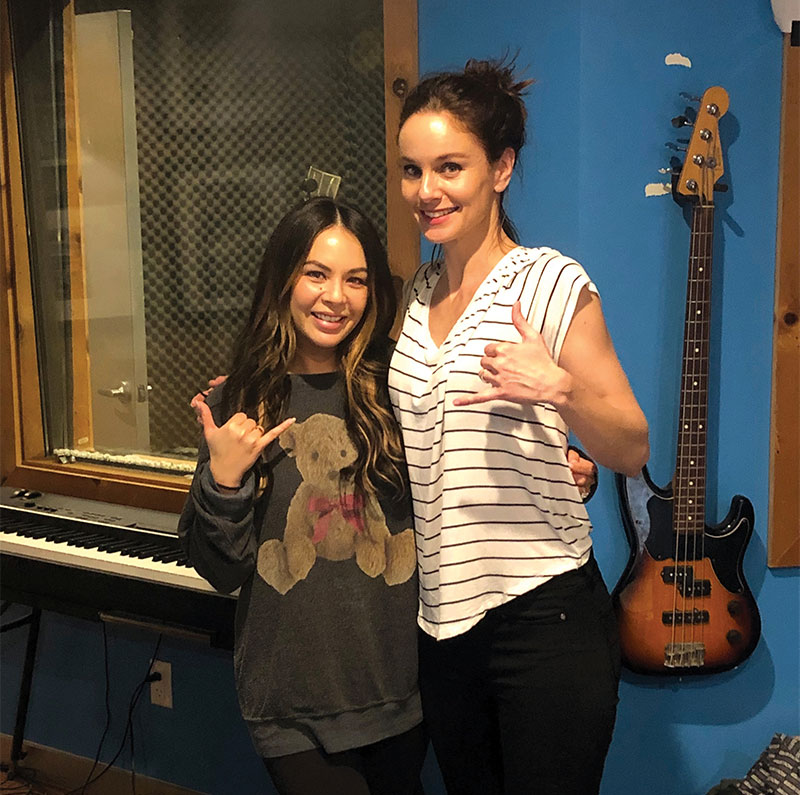
Sarah Wayne Callies and another former Hawai‘i resident, Janel Parrish, flash shakas after completing a recording session for Aftershock
Admittedly, Callies also had other factors working in her favor beyond her sales ability. The actors she petitioned were mostly close friends of hers, and when she began to approach them in the summer of 2020, everyone was available because “none of us were working due to the pandemic.”
Still, she deserves kudos for bringing the entire project together while keeping expenses at a minimum.
“Obviously, I didn’t have a whole lot to offer,” admits Callies, who says she cast the project out of her phone contact list. “But what I did say to everybody was, ‘If we ever get a chance to do this as a television show or film, the roles are yours.’ We’re not going to be like ‘Sayonara, Dave Harbour — welcome, Brad Pitt!’ It was more like, ‘You help me out with this and you’ll be attached to the project no matter what happens.’”
The results have been far greater than even she anticipated as Aftershock‘s positive reverberations are being felt everywhere.
The 10-part series — which released its first two episodes July 13 and is set to drop its eighth installment this week (with a special roundtable discussion involving the cast to follow the final episode on Sept. 15) — tells the story of Cassie Wallace (voiced by Callies), a mother in search of her daughter after a violent earthquake rocks the West Coast and leaves LA in ruins. Out of this national emergency emerges an island just off the California coast — which attracts doomsday preppers, indigenous activists and a utopian cult, all of whom arrive in this new locale demanding their piece of the land.
If anything, choosing a mysterious island as the setting for the series was a major selling point for the Honolulu-raised Callies.
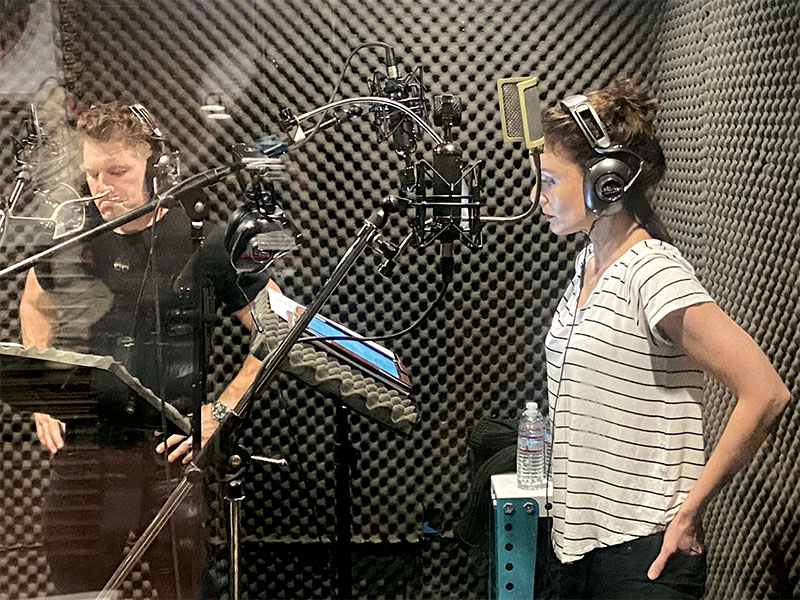
One of the actors who signed on for the project is Austin Amelio, shown here trading lines with Sarah Wayne Callies in a studio. The 10-part series of Aftershock wraps up Sept. 15, and can be listened to on iHeartRadio. PHOTOS COURTESY SARAH WAYNE CALLIES
“I remember thinking when this kernel of an idea was first brought to me (by executive producers Ben Haber and Patrick Carman), well, I’ve lived on islands and oceans my whole life. I grew up in Hawai‘i, I live on Vancouver Island right now, and there’s something very specific about living on an island,” explains Callies, who not only has the lead role in the scripted podcast, but juggles co-creator, director and executive producer duties as well.
“It also seemed to me that it would be an opportunity to tell stories that I’ve known my whole life that I haven’t seen very often in pop culture.”
One of the storylines she desperately wanted included was the plight of indigenous peoples and their fight for control of their lands — and she found no better example of that than right here in Hawai‘i. Early on in the writing process, Callies insisted the script include a character that shows up on the new island, plants an unfurled Hawaiian flag in the ground, and declares, “I claim this island in the name of the Hawaiian nation!”
The show’s other executive producers immediately balked at the idea.
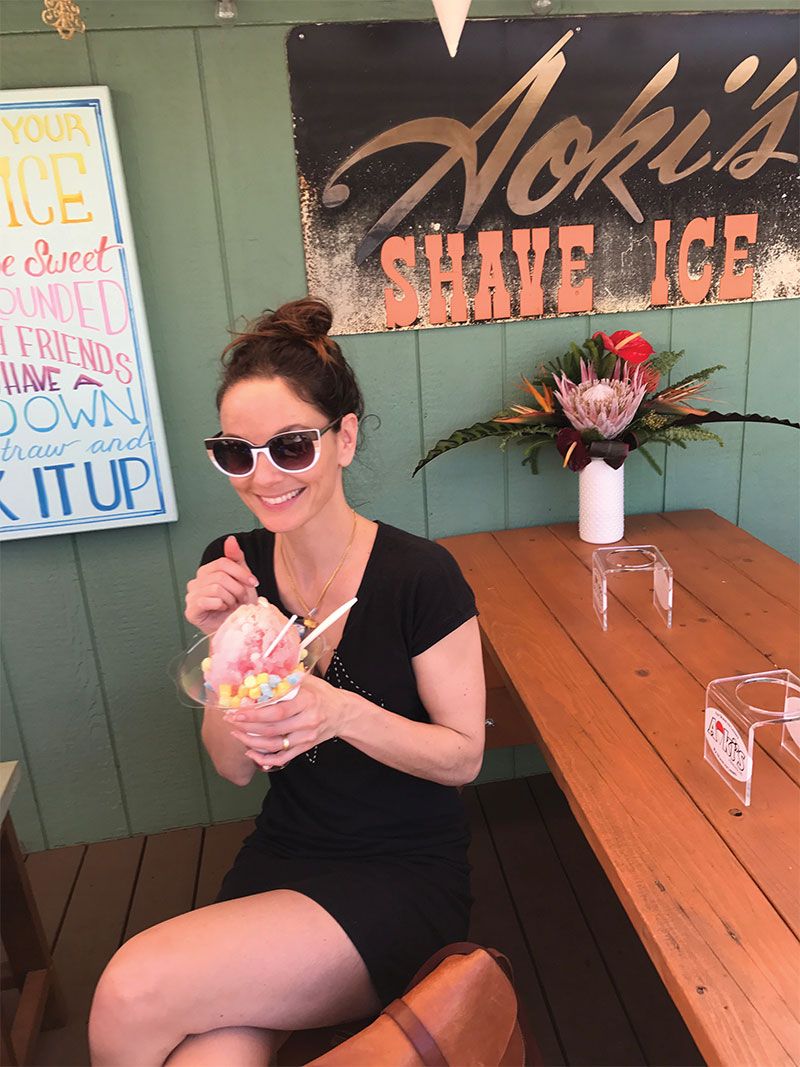
Whenever she’s in Hawai‘i, Sarah Wayne Callies is sure to be found consuming malasadas, Spam musubi or anything cool from Aoki’s Shave Ice in Hale‘iwa.
“They were like, ‘That’s ridiculous!’” Callies recalls. “I said ‘Yeah, I know.’ They were like, ‘That would never happen.’ I said, ‘Oh, no-nono! It’s simultaneously ridiculous and that’s exactly what happened in Hawai‘i!’”
Ultimately, Callies won the debate and Parrish, a former Kāne‘ohe resident, got the role of Hawaiian activist.
To complete the podcast’s recordings, sessions were held in New York and LA. Most recordings, however, had to be done remotely due to coronavirus restrictions and actors’ schedules. To work around these issues, Callies would send a microphone via Federal Express to the actors’ homes or wherever they happened to be at the time. (Gabrielle, in fact, finished her recordings from 5,000 miles away in Germany.)
“It was such a circus and it took us months,” explains Callies of the drawn-out recording process. “I’d send the mic to their house and we’d do a sound check. Then I’d say, ‘OK, you’re going to have to be in some place where the sound isn’t going to bounce around, so go in your closet, but lay all the pillows down and put a comforter over your head.’
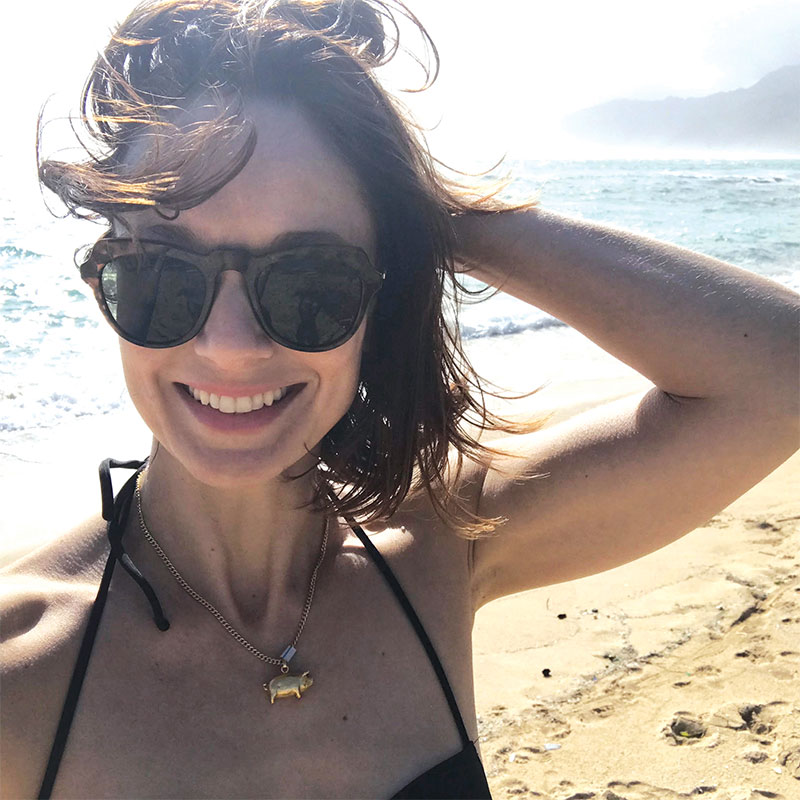
The actress — shown here soaking up the sun at a local beach — usually splits her time between O‘ahu, where her mother lives, and the Big Island during her visits to the 50th state. PHOTOS COURTESY SARAH WAYNE CALLIES
“It really was the most ridiculous thing!”
Amazingly, some cast members were willing to go to even greater lengths to ensure the job was done right. For example, Rockmond Dunbar (Prison Break, Sons of Anarchy) chose to do his recordings from the trunk of his car.
“Rockmond has four young children and they’re all homeschooling, so he chose to lock himself in the car because it was the only place where he could get peace and quiet,” recalls a chuckling Callies. “When we were done, he said, ‘Now I gotta text my wife and have her pop the trunk!’”
Despite the production challenges, Callies is proud that she and her star-studded cast of unpaid actors were able to put out a quality scripted podcast in what she calls “an emerging form of entertainment.” As proof that the team’s efforts have not been in vain, she notes that feedback from Aftershock fans has been “better than I expected.”
“We were the No. 1 drama podcast of all time on Apple for a bit there. I don’t think we still are, but we were for a couple of weeks and that was cool,” gushes Callies.
“To be honest, I didn’t really know if anybody would listen. It was kind of a shot in the dark. I think the thing that people seem to be responding to is how immersive it is. Often when you say podcast to people, they think, ‘Oh, it’s going to be a couple of people chatting in my ear and I’m just listening in on a conversation.’
“But scripted podcasts are much more of a niche thing … almost underground,” she continues. “I think the experience is new for a lot of people. Hopefully, it continues to provide that level of escapism and joy for people.”
Callies was born in Illinois, but relocated to the Hawaiian Islands with her parents (Valerie Wayne and David Cal-lies, who were English and law professors, respectively, at University of Hawai‘i-Mānoa) when she was 1. After her parents split up, Callies — who first lived in Mānoa, and later in Kāhala — moved into an apartment in Makiki with her mother, who still resides there till this day.
“In some ways, I feel like Hawai‘i was like my third parent,” says the actor, who graduated from Punahou School in 1995. “I mean I got to grow up in a place with malasadas and Spam musubi. That in and of itself is a win.”
Although she still makes frequent visits to Hawai‘i with her husband, Josh Winterhalt, and their two children, Callies confesses to missing the islands terribly. Thankfully, she hasn’t lost her pidgin accent — “Eh, Russell! You get pen?” she cracks while reminiscing about growing up in the era of comedians Rap Reiplinger and Frank De Lima — neither has she forgotten how Hawai‘i was the fertile ground upon which she grew her talents in the performing arts (even though she didn’t seriously consider becoming a professional actor until she was at Dartmouth College).
“I definitely started acting in junior high and then took it a little bit more seriously when I got to high school, but it didn’t seem practical as a way to make a living,” says Callies, whose first professional starring role came in 2003 as Det. Jane Porter on The WB series Tarzan.
“Initially, I sort of thought that I would follow in my mom’s footsteps, get a Ph.D. and become a professor. But it really wasn’t until my senior year in college that I realized I was going to be really sad without the arts in my life.
“So, I made an agreement with myself that I would try to fail at the arts, and then I could be happy settling for something else. But I had to try first; I had to say I swung and I missed, and now I’m ready to go and be a grown-up.”
She pauses momentarily to think about her current status before quipping, “I guess I never really grew up.”
Not that the accomplished actress is complaining about a career that not only pays the bills, but allows her to experiment in new fields of entertainment such as scripted podcasts.
“Every day I get to say I’m a working artist is a good day,” says the extremely content Callies. “It’s more than I ever thought. I got a great life and it’s not real complicated. You do something you love. You have good kids. Your spouse is your best friend. You live in a beautiful place.
“If there’s something more than that out there, I don’t really care.”
Aftershock is available on iHeartRadio and all major podcast platforms.

